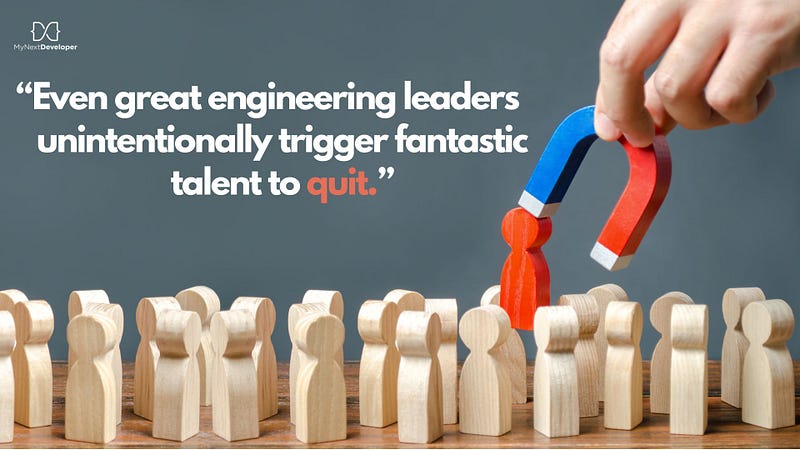Focused on output over engineers? If this sounds familiar, your culture is the problem.
Focused on output over engineers? If this sounds familiar, your culture is the problem.

As a seasoned software engineer, I’ve had the privilege of working on some incredible projects alongside some truly brilliant minds. I’ve also witnessed firsthand the factors that can drive even the most talented engineers to quit their jobs in frustration.
In this blog post, I’ll share my insights on how to lose a fantastic engineer, based on my experiences and observations.
In today’s dynamic and competitive tech industry, attracting and retaining top-tier engineers is not just an option, but a requirement for any company’s survival and growth. These skilled individuals are the inspiration behind innovation, product development, and, ultimately, business success. Their expertise, creativity, and problem-solving abilities are instrumental in shaping the technological landscape and propelling companies to the forefront of their respective industries.
According to the 2022 Dice Tech Talent Survey, 48% of tech professionals are planning to leave their current jobs within the next year. This alarming statistic highlights the growing trend of engineer attrition, which is costing companies billions of dollars in lost productivity and knowledge.
That fantastic engineer on your team has options. Don’t give them reasons to leave.
The Culprits Behind the Exodus:
While there are various factors that contribute to engineer attrition, three common mistakes stand out as major culprits:
1. Endless Bug Fixes, No Creative Projects
Engineers are naturally problem solvers. They love challenges and coming up with beautiful solutions to knotty situations. However, when their days are spent with a never-ending stream of routine bug patches, their creativity begins to fade.
According to a study conducted by Indeed, 52% of engineers leave their professions owing to a lack of demanding work. They are looking for opportunities to put their expertise to use, to create and build creative solutions. When their potential is limited by monotonous work, they will seek employers who value their originality and expertise.
2. Micromanagement: The Death of Autonomy
Engineers are not machines; they are highly qualified people who have a thorough understanding of their profession. Micromanaging an engineer is not only impolite but also ineffective. It restricts their creativity, hampers their problem-solving skills, and eventually leads to disengagement.
According to a Gallup poll, only 33% of employees are engaged at work. Micromanagement plays a crucial role in this disengagement. Engineers feel underappreciated and unloved when their decisions are continuously second-guessed and overridden.
3. No Autonomy in Technical Decisions
Engineers are enthusiastic about their work. They take pleasure in their ability to create and implement effective solutions. However, when they are denied the ability to make technical decisions, their enthusiasm quickly disappears.
According to a GitLab survey, 86% of engineers say they should have greater autonomy in making technical decisions. Engineers’ excitement wanes when they are viewed as mere cogs in a machine. They want to be involved in decision-making, share their knowledge, and assist in determining the company’s technological orientation.
What Steps Can Be Taken for Improvement?
Fantastic engineers deserve fantastic leadership. Without it, they’ll be out the door.
If you’re realizing that your company might be falling into these traps, don’t despair. There are steps you can take to reverse the brain drain and create an environment where top engineers thrive:
- Encourage continuous learning and development: Give engineers the opportunity to expand their knowledge and abilities. Invite them to conferences, workshops, and online courses.
- Encourage experimentation and risk-taking to promote an innovative culture: Create an environment in which engineers can freely share ideas and challenge the status quo.
- Allow engineers to make decisions: Allow engineers to make technical decisions on their own. Trust their knowledge and allow them to take ownership of their job.
- Recognize and reward accomplishments: Celebrate both large and little achievements. Engineers should be publicly recognized and rewarded for their achievements.
Conclusion
Losing a fantastic engineer is a major setback for any company. It can lead to project delays, lost productivity, and a decline in morale. By avoiding the pitfalls I’ve outlined in this blog post, companies can create a work environment that attracts and retains top engineering talent.
Remember that engineers are the foundation of any technology firm. Companies may guarantee that they have the talent they need to compete in the ever-changing world of technology by investing in their growth and providing them with the flexibility to do their best job.





